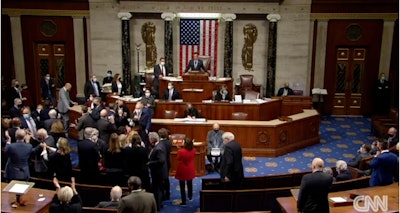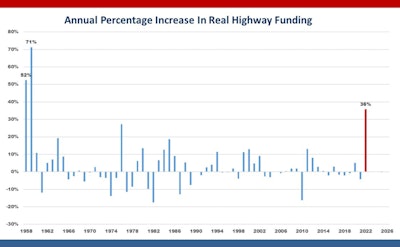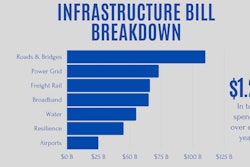
Better late than never, right? After weeks of party infighting and debate, House Democrats late Friday night clinched a long-sought victory on President Biden’s domestic agenda, passage of the $1.2 trillion bipartisan infrastructure bill named the Infrastructure Investment & Jobs Act (IIJA).
The passage came after a progressive Democrats agreed to compromise with the rest of the party to unlink Biden's larger economic package, the Build Back Better plan, from the Senate-passed bipartisan infrastructure deal. The climate and social spending package is now being negotiated with final language being drafted. It will then receive a cost estimate from the nonpartisan Congressional Budget Office (CBO). It is expected to reach the floor the week of Nov. 15.
The tally on the infrastructure bill was 228-206, with 13 Republicans crossing the aisle to support the measure, and six progressive Democrats bucking Biden and Cheers on the House floor after the $1.2 trillion Infrastructure Investment & Jobs act passesCNN
Cheers on the House floor after the $1.2 trillion Infrastructure Investment & Jobs act passesCNN
“The Bipartisan Infrastructure Framework is a generational investment essential to repair and rebuild our crumbling infrastructure, bolster our economy, and keep America globally competitive" Congressman David Price (NC-04), Chairman of the Transportation, and Housing and Urban Development, and Related Agencies (T-HUD) Appropriations Subcommittee and a member of the House Budget Committee said. "In passing this legislation, we are delivering good-paying jobs, investing in clean water infrastructure, and bringing broadband access to millions of Americans, including the more than 400,000 North Carolinians who currently lack reliable internet access."
Now that this legislation is set to become law, communities across the country will begin to reap the benefits of these investments in the weeks and months ahead.
"A Monumental Step Forward"
The Senate passed the measure to the House August 10th, but it took nearly two months for it to make it to Biden's desk. After its passage, Biden addressed reporters saying the bipartisan infrastructure bill was "a monumental step forward as a nation."
"It will create good-paying jobs that can’t be outsourced. Jobs that will transform our transportation system with the most significant investments in passenger and freight rail, roads, bridges, ports, airports, and public transit in generations," he said in a statement. "This will make it easier for companies to get goods to market more quickly and reduce supply chain bottlenecks now and for decades to come. This will ease inflationary pressures and lower costs for working families."
Highlights of the IIJA:
- $303.5 billion over five years for Federal Highway programs, a 35% increase from previous bills
- $450 billion for highway and public transportation investments and a new, five-year reauthorization of federal surface transportation programs
- Overall package includes $40 billion in dedicated resources for bridge repair, replacement and rehabilitation, which is the single largest dedicated bridge investment since the construction of the interstate highway system
- $55 billion for water projects with a focus on upgrading infrastructure - largest investment in clean drinking water in our nation's history
- Project permitting overhauls to move projects forward more quickly. The environmental impact statements under NEPA takes an average of seven years. This bill provides numerous provisions including the One Federal Decision for highway projects which establishes a two year goal for project approval
- $66 billion in passenger and freight rail
- $65 billion to rebuild the electric grid
- $65 billion to expand broadband Internet access
- $39 billion to modernize and expand transit systems
- $7.5 billion to build a national network of charging infrastructure for electric vehicles
The legislation includes $550 billion in new spending, which Biden and Democrats had sought. The remainder of the package is funded by tapping unspent coronavirus relief funds already in law. Ratification of this bipartisan effort to safeguard and advance the nation’s infrastructure will provide an additional investment of $110 billion for roads and bridges – for a total $360 billion over five years – guaranteeing predictable and enhanced funding for state and local governments to build, repair and maintain their roadways.
Industry Ready to Get to Work
This was an historic and impactful week for the transportation construction industry and we are ready to put this money to work. The delay in House approval of the IIJA in no way overshadows the five-plus year impact the nation will receive from its enactment.
Statement of ARTBA President & CEO Dave Bauer:
“The Infrastructure Investment and Jobs Act is the most significant measure in more than 50 years to meaningfully address the condition and performance of the U.S. transportation network.
“Members of the U.S. Senate and House of Representatives have demonstrated not only the importance of federal transportation infrastructure leadership, but that This chart from ARTBA’s economics team demonstrates the historic context of this measure, an outcome worth the months of engagement and hard work by the transportation construction industry that contributed to this major achievement.American Road & Transportation Builders Association
This chart from ARTBA’s economics team demonstrates the historic context of this measure, an outcome worth the months of engagement and hard work by the transportation construction industry that contributed to this major achievement.American Road & Transportation Builders Association
“We salute President Joe Biden, House Speaker Nancy Pelosi (D-Calif.), House Majority Leader Steny Hoyer (D-Md.), Senate Majority Leader Chuck Schumer (D-N.Y.), Senate Minority Leader Mitch McConnell (R-Ky.), Sen. Tom Carper (D-Del.), Sen. Shelley Moore Capito (R-W.Va.), Sen. Kyrsten Sinema (D-Ariz.), Sen. Rob Portman (R-Ohio), and Rep. Peter DeFazio (D-Ore.) for their leadership in getting the job done, along with other members of Congress who voted for final passage.
“In today’s political environment where distortions and broadsides masquerade as solutions, members of Congress have taken tangible action that will benefit every state and community across the nation.
“The transportation construction community now welcomes the opportunity to use these historic investments to deliver infrastructure outcomes that will improve the quality of life for all Americans.”
U.S. Chamber Applauds Passage of the Bipartisan Infrastructure Bill, Continues to Oppose Reconciliation
U.S. Chamber of Commerce President and CEO Suzanne Clark today issued the following statement after the U.S. House of Representatives passed the bipartisan infrastructure bill:
“Today’s passage of the bipartisan infrastructure bill is a major win for America.
“We thank every member of the House and Senate who cast a vote for America’s future. This historic victory wouldn’t have been possible without the leadership of Senators Portman, Cassidy, Sinema, and Manchin, and key members of the House Problem Solvers Caucus.
“The Infrastructure Investment and Jobs Act will help connect 14 million Americans to broadband, provide clean drinking water for 10 million families, upgrade our energy grid, and create millions of jobs. It is the single largest investment in bridges since construction of the Interstate Highway System and the single largest investment made to address climate change in U.S. history.
“For more than 25 years, the Chamber has led the charge for investment in America’s crumbling infrastructure. We will continue to work with our partners in business, labor, and government to identify projects with the most critical need, help find the necessary workers to get started, and bring much-needed investment to communities across America.
“The bipartisan infrastructure negotiations showed us how Congress can work together to solve today's most pressing challenges.
“Members of the House also made the right decision in delaying consideration of the partisan reconciliation bill. It would be the height of irresponsibility for Members of Congress to vote on a multi-trillion tax-and-spend bill without even knowing its true cost or even pausing to consider the policy ramifications. The Chamber applauds those Members who helped inject some sanity into this process."
National Asphalt Pavement Association Statement:
“This bill represents a once-in-a-generation investment in the country’s transportation networks, demonstrating America’s long-standing commitment to provide safe roads, airports, and transit for the traveling public,” said NAPA President and CEO Audrey Copeland. “We urge President Biden to quickly sign this bipartisan package into law, so we can build back better with increased jobs, enhanced safety, and improved roads.”
“The hard-working women and men of the asphalt pavement industry applaud the inclusion of many elements NAPA advocated and supported,” added Jay Hansen, NAPA’s Executive Vice President for Advocacy. Among NAPA priorities included in the final bill are reauthorization of the Accelerated Implementation and Deployment of Pavement Technologies (AID-PT) program to advance innovation for constructing and maintaining long-lasting pavements, as well as increased federal contributions to safety contingency funds to protect the women and men working daily to keep Americans and the economy moving so they can return home safely."
Also notable is an absence of pavement selection mandates, empowering road owners and engineers who know the projects best to design and build cost-effective pavements that serve their communities efficiently.
The last long-term funding bill, Fixing America’s Surface Transportation (FAST) Act, was originally set to expire in 2020 but has been temporarily renewed while legislators and stakeholders worked toward a long-term approach. The result is IIJA, which increases highway and bridge programs by 55 percent over the FAST Act’s 2015 baseline. As a result, NAPA projects each state will receive more than $1 billion total in Federal Highway Administration funding to repair and improve roads and bridges.
“This is a sea-to-shining-sea investment in the American people,” NAPA Chairman Jay Winford said. “Every state stands to benefit from this law and we know our members are eager to get to work. Thanks to the NAPA legislative team and our engaged membership for helping to bend ears in Washington and craft this legislation into a bill that best serves motorists, businesses, and road owners. This is truly a great investment for our country.”
Statement of Association of Equipment Manufacturers (AEM) Senior Vice President of Government and Industry Relations Kip Eideberg:
“Tonight’s vote represents a win for bipartisanship and a once-in-a-generation investment in the future of our country. We salute this rare and historic bipartisan victory for the 2.8 million men and women of the equipment manufacturing industry. It will make us more competitive, more prosperous, and more equitable as a nation. Equipment manufacturers have long criticized the partisan rancor and division that has undermined much-needed investments in our future. The lawmakers who put country first and voted in favor of the Infrastructure Investment and Jobs Act have demonstrated real leadership and a commitment to our nation’s renewal.”
Read more on AEM's thoughts on the benefits of an infrastructure bill for the heavy equipment manufacturing industry in this recent Q&A with President Dennis Slater.
AED’s President & CEO Brian P. McGuire issued the following statement after the House of Representatives’ vote:
“After many years of delay, Congress finally did its job and approved bipartisan legislation that will provide historic investments to upgrade the United States’ infrastructure. This long-sought achievement didn’t come easy and wouldn’t have happened without the unprecedented involvement of AED members engaging during the lengthy legislative process. IIJA’s enactment is truly an achievement for the equipment industry, its customers, and the entire country. AED members are ready to provide the machinery needed to rebuild the country.”
“Unfortunately, politics unnecessarily delayed IIJA’s passage and it’s regrettable that every House and Senate member didn’t support the bill. The Senate set an example with its deliberative and thoughtful consideration of the proposal last summer, but its counterparts in the House failed to follow suit. The House’s politicization of much-needed, bipartisan infrastructure legislation is unfortunate and caused by members of both parties.”
“The lawmakers, Democrat and Republican, that chose to do what was right for the country over the politics of the day should be commended. AED and its members won’t forget the courageous stance many took in the face of immense political pressure and misinformation campaigns.”
Portland Cement Association (PCA) President and CEO Michael Ireland released the following statement:
“The Portland Cement Association applauds the U.S. House of Representatives for finally passing the Infrastructure Investment and Jobs Act. This bipartisan infrastructure bill not only addresses years of underinvestment in the nation’s infrastructure but will spur economic growth and job creation in communities across the country, improving the quality of life and our nation’s global competitiveness. As many are still recovering from the COVID-19 pandemic, this legislation will further our nation’s recovery, creating thousands of well-paying jobs.
PCA Members across the country appreciate the legislation passing a long-term reauthorization of the surface transportation program, including significant investments in our water infrastructure, providing funding for DOE to focus on the research, development, and deployment of technologies for manufacturers to capture carbon emissions, and the exemption of cement from Buy America requirements. We are eager for President Biden to sign this legislation into law and start building a better future for America.”
The National Stone, Sand & Gravel Association (NSSGA) President and CEO Michael Johnson issued the following statement regarding the House passage of the bipartisan Infrastructure Investment and Jobs Act by a vote of 228-206.
“This is a monumental moment for our industry, and it has been greatly needed for quite some time. NSSGA appreciates the House of Representatives for passing this bill ahead of the next short term extension deadline.
“NSSGA has tirelessly worked with all stakeholders this year to achieve this historic moment. Today’s passage represents the plethora of emails, calls, and meetings from the aggregates industry with Members of Congress and their staffs.
“The passage of this landmark legislation is something our nation has needed to move our infrastructure network into the 21st century, and the aggregates industry is ready to meet the demands. We look forward to working with Congress and the Administration on implementing the Infrastructure Investment and Jobs Act. Our members are prepared to advance the countless number of projects in local communities around the U.S.”
Statement by International Tolling Association on Congressional Approval of the Infrastructure Investment and Jobs Act of 2021:
The International Bridge, Tunnel and Turnpike Association (IBTTA), the worldwide association for the owners and operators of toll facilities and the businesses that serve them, released the following statement today following House passage of H.R. 3684 (117), the Infrastructure Investment and Jobs Act.
“IBTTA and its members salute Congress for passing the Infrastructure Investment and Jobs Act. This is an essential step in rebuilding and modernizing the nation’s transportation infrastructure. The reauthorization of the federal surface transportation program and commitments to additional new investment will continue to ensure America’s economic competitiveness, safety and sustainability. We are pleased that the legislation recognizes the important role that tolling and road pricing plays in meeting America’s investment, mobility and climate change challenges,” said Mark Compton, CEO of the Pennsylvania Turnpike Commission and 2021 President of IBTTA.
“IBTTA and its members are ready to support Congress, the U.S. Department of Transportation and the Administration to put this legislation into action for the American people. We offer the leadership and innovation of the IBTTA community in transportation and tolling to ensure that we make the most of these historic infrastructure investments by strengthening our economy and improving the lives of all Americans,” said Pat Jones, Executive Director and CEO of IBTTA. “We will continue to promote tolling and road pricing programs as an equitable and sustainable means of transportation funding and finance,”Jones added.
Patrick Sabol, Co-Founder and CEO of United for Infrastructure said after the vote:
"As President Biden recently said, “after years and years and years of ‘Infrastructure week’ – we're on the cusp of an infrastructure decade.” With the passage of the Infrastructure Investment and Jobs Act, that decade starts today. We all know that one bill won’t fix all the problems facing our sector. However, it is a time to celebrate the collective work of the hundreds of organizations and thousands of individuals that brought us to this moment.
While the fight in Congress is over, the work is just beginning for the federal agencies tasked with implementation, the state and local governments responsible for the projects themselves, as well as the labor, business, and civic groups that will do the hard work of delivering world class infrastructure for their communities."
Autodesk CEO Andrew Anagnost: Rebuilding Our Nation’s Infrastructure Alongside Customers
"The passage of the bipartisan Infrastructure Investment and Jobs Act marks an historic moment in the future of our infrastructure, our economy, and the health of our communities. It also signals recognition by the Biden Administration and Congress that our infrastructure is too important to fail.
"We need to meet the rehabilitation of our aging infrastructure with modern innovation. The IIJA shows that the Biden Administration and Congress are ready to get ahead of the infrastructure innovation curve with the creation of a new program to help state DOTs incorporate digital design, construction, and operations tools into their processes and those of their contractors from planning through operations. The legislation also begins the process of mitigating harm caused by lead pipes, improving the health and safety of at-risk communities and the people who reside in them. Overall, it will enable our customers and the industry at large to lead projects that are built better, faster, more affordably, and that are more innovative, resilient and climate conscious.
"This will be the backbone for how Autodesk customers respond to and embrace digital transformation for all types of infrastructure, and together, we stand ready to support this effort and rebuild our nation’s infrastructure."




















